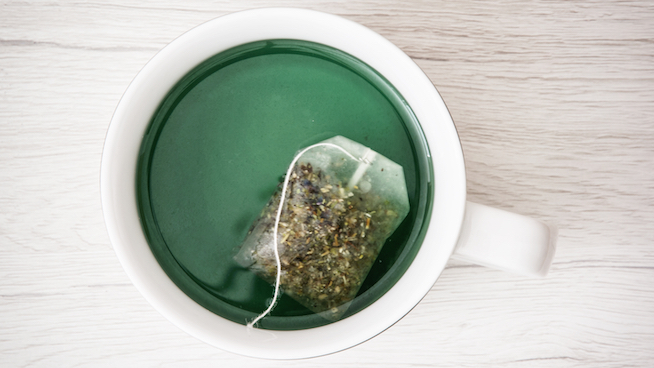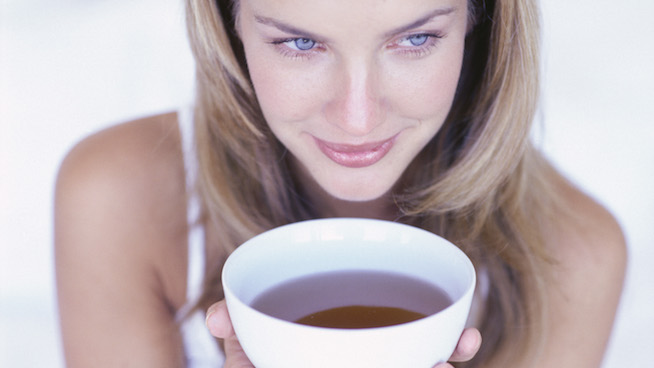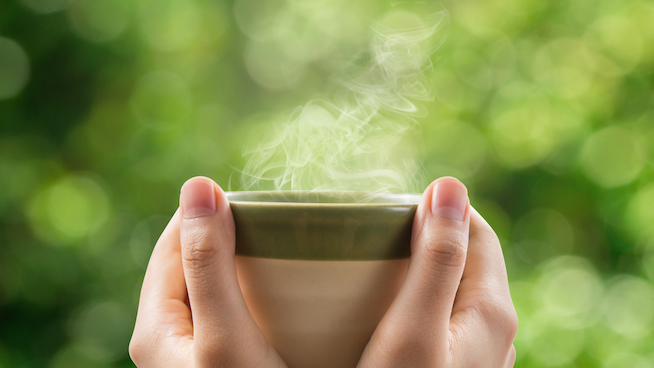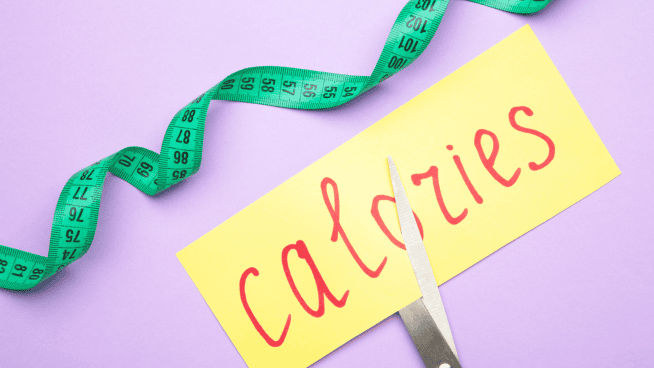Are Herbal Tea Health Claims Legit?
Take a stroll down the herbal tea aisle, and you might swear you’ve stumbled upon the secret to eternal life.
Nowadays, there’s an herbal tea for everything. Stress relief. Respiratory health. Sleep. Weight loss. Increased energy. Digestion. Healthy skin. Cold prevention. Improved memory. Enhanced muscle recovery. Healthier joints. Improved mood. Healthy menstruation. Healthy pregnancy. And those are just the ones sold by a single company! But each of these products comes with a disclaimer—“These statements have not been evaluated by the FDA. This product is not intended to diagnose, treat, cure or prevent any disease.”
What gives? Are herbal teas really a powerful group of health-enhancing elixirs, or are they just glorified by slick marketing? STACK investigates this burgeoning business.
Ancient Roots

Herbal teas have been around for thousands of years, dating back to Ancient Egypt and Ancient China. They have almost always been connected to health and wellness in some way, a history which has given them a mysticism.
“If you believed everything you could read about tea in books, journals, and magazines and on the Internet then you would immediately convert your diet to an all-tea liquid diet. Based on its aggregate health claims, tea is literally a cure-all. The sources that claim that tea can improve your health vary from ancient religious and spiritual texts to modern medical journals and everything in between. Of course many of these claims stretch the boundaries of modern science and statistics, and others are based on mere coincidence,” writes the author of a 2004 Harvard research paper entitled “The Regulation of Tea and Its Health-Related Claims in the Wake of Developing Scientific Evidence: Food, Drugs, Or Dietary Supplement?”
The Camellia sinesis is the only plant in the world that produces tea leaves. Those leaves are processed to produce three distinct basic types of tea—black, green and oolong. Black tea is processed by allowing the tea leaves to fully oxidize. Green teas are not oxidized so as to preserve their natural color and flavor. Oolong tea is a middle ground between the two. Technically, black, green and oolong teas are the only actual “teas.”
Herbal teas, on the other hand, are defined as “tisane.” Tisane is any beverage made from “the infusion or decoction of herbs, spices or other plant material in hot water, and usually does not contain caffeine.” So herbal tea isn’t technically tea—that’s one myth debunked. It’s an important distinction, since most of the research out there has been done on green, black or oolong teas—not tisanes.
The existing research on green, black and oolong teas is quite encouraging.
“It is increasingly appreciated that tea contains polyphenols and other components that may reduce the risk of developing chronic diseases such as cancer, cardiovascular diseases, arthritis and diabetes,” write the authors of a 2013 review entitled Tea and Health: Studies in Humans.
However, research has also been done on herbal teas.
RELATED: Why Every Athlete Should Drink Tea
Healthy Herbals

A 2011 study conducted by the USDA Human Nutrition Research Center on Aging at Tufts University sought to find the health benefits—or lack thereof—of three popular herbal tea varieties.
Chamomile tea has traditionally been associated with helping the drinker fall soundly asleep, yet there’s little research in this area. However, researchers found that chamomile tea has moderate antioxidant and antimicrobial activity. Antimicrobials help the body fight off infections. Chamomile tea also has anti-platelet-clumping capabilities, meaning it could reduce the risk of cardiovascular disease.
The second tea analyzed was peppermint tea. Researchers found that it also had significant antioxidant and antimicrobial activity. It also has anti-tumor actions, moderate anti-allergenic potential and, in animal studies, positive effects on digestion.
The third tea tested was hibiscus tea. The researchers conducted a trial in which half the participants drank actual hibiscus tea for six weeks while the other half drank a fake version that simply tasted like hibiscus tea. After six weeks, the hibiscus tea group saw their systolic blood pressure drop by an average of 7.2 points—compared to a drop of just 1.3 points in the control group.
RELATED: Why Antioxidants Matter
Those are pretty impressive results, but many herbal teas remain unproven.
“[Many herbal teas] have been around a long time, and they’ve been used in traditional medicine and folk medicine,” Diane McKay, a researcher and assistant professor of nutrition science and policy told DallasNews.com. “But very few have been studied in well-designed research trials.”
Since most herbal teas are sold as “herbal supplements,” they need just a small bit of evidence on file to support broad health claims. You’ll notice that herbal teas almost never market themselves as a “cure” or “treatment” for any disease or condition. That’s why herbal teas are often purposefully vague in their titles, using names like “Throat Comfort” and “Blues Away.” If they were marketed offering more concrete results, the FDA might have to get involved.
However, lack of evidence doesn’t mean there’s no potential for evidence. While a lot of herbal teas have yet to be studied in well-designed research trials, many have shown promise in animal studies. There’s also the fact that many of their natural ingredients are thought to have had healing powers in certain civilizations for centuries. When the research isn’t there, anecdotal evidence shouldn’t be written off entirely.
A Guilt-Free Beverage

Hands holding tea cup on green bokeh background.
Should herbal teas replace your medicine cabinet?
Probably not. But there’s no harm in drinking it while we wait for more conclusive research to be conducted (unless you’re allergic to one of the ingredients, of course). There’s a chance that doing so will significantly boost your health, and even if it doesn’t, herbal teas are a marked improvement over beverage options like soda. They’re low in calories, fat and sugar. They’re also quite affordable. So go ahead and put the kettle on—just don’t expect any miracles from your morning cup of herbal tea.
RELATED: 5 Drinks You Had No Idea Were as Bad (Or Worse) Than Soda
RECOMMENDED FOR YOU
MOST POPULAR
Are Herbal Tea Health Claims Legit?
Take a stroll down the herbal tea aisle, and you might swear you’ve stumbled upon the secret to eternal life.
Nowadays, there’s an herbal tea for everything. Stress relief. Respiratory health. Sleep. Weight loss. Increased energy. Digestion. Healthy skin. Cold prevention. Improved memory. Enhanced muscle recovery. Healthier joints. Improved mood. Healthy menstruation. Healthy pregnancy. And those are just the ones sold by a single company! But each of these products comes with a disclaimer—“These statements have not been evaluated by the FDA. This product is not intended to diagnose, treat, cure or prevent any disease.”
What gives? Are herbal teas really a powerful group of health-enhancing elixirs, or are they just glorified by slick marketing? STACK investigates this burgeoning business.
Ancient Roots

Herbal teas have been around for thousands of years, dating back to Ancient Egypt and Ancient China. They have almost always been connected to health and wellness in some way, a history which has given them a mysticism.
“If you believed everything you could read about tea in books, journals, and magazines and on the Internet then you would immediately convert your diet to an all-tea liquid diet. Based on its aggregate health claims, tea is literally a cure-all. The sources that claim that tea can improve your health vary from ancient religious and spiritual texts to modern medical journals and everything in between. Of course many of these claims stretch the boundaries of modern science and statistics, and others are based on mere coincidence,” writes the author of a 2004 Harvard research paper entitled “The Regulation of Tea and Its Health-Related Claims in the Wake of Developing Scientific Evidence: Food, Drugs, Or Dietary Supplement?”
The Camellia sinesis is the only plant in the world that produces tea leaves. Those leaves are processed to produce three distinct basic types of tea—black, green and oolong. Black tea is processed by allowing the tea leaves to fully oxidize. Green teas are not oxidized so as to preserve their natural color and flavor. Oolong tea is a middle ground between the two. Technically, black, green and oolong teas are the only actual “teas.”
Herbal teas, on the other hand, are defined as “tisane.” Tisane is any beverage made from “the infusion or decoction of herbs, spices or other plant material in hot water, and usually does not contain caffeine.” So herbal tea isn’t technically tea—that’s one myth debunked. It’s an important distinction, since most of the research out there has been done on green, black or oolong teas—not tisanes.
The existing research on green, black and oolong teas is quite encouraging.
“It is increasingly appreciated that tea contains polyphenols and other components that may reduce the risk of developing chronic diseases such as cancer, cardiovascular diseases, arthritis and diabetes,” write the authors of a 2013 review entitled Tea and Health: Studies in Humans.
However, research has also been done on herbal teas.
RELATED: Why Every Athlete Should Drink Tea
Healthy Herbals

A 2011 study conducted by the USDA Human Nutrition Research Center on Aging at Tufts University sought to find the health benefits—or lack thereof—of three popular herbal tea varieties.
Chamomile tea has traditionally been associated with helping the drinker fall soundly asleep, yet there’s little research in this area. However, researchers found that chamomile tea has moderate antioxidant and antimicrobial activity. Antimicrobials help the body fight off infections. Chamomile tea also has anti-platelet-clumping capabilities, meaning it could reduce the risk of cardiovascular disease.
The second tea analyzed was peppermint tea. Researchers found that it also had significant antioxidant and antimicrobial activity. It also has anti-tumor actions, moderate anti-allergenic potential and, in animal studies, positive effects on digestion.
The third tea tested was hibiscus tea. The researchers conducted a trial in which half the participants drank actual hibiscus tea for six weeks while the other half drank a fake version that simply tasted like hibiscus tea. After six weeks, the hibiscus tea group saw their systolic blood pressure drop by an average of 7.2 points—compared to a drop of just 1.3 points in the control group.
RELATED: Why Antioxidants Matter
Those are pretty impressive results, but many herbal teas remain unproven.
“[Many herbal teas] have been around a long time, and they’ve been used in traditional medicine and folk medicine,” Diane McKay, a researcher and assistant professor of nutrition science and policy told DallasNews.com. “But very few have been studied in well-designed research trials.”
Since most herbal teas are sold as “herbal supplements,” they need just a small bit of evidence on file to support broad health claims. You’ll notice that herbal teas almost never market themselves as a “cure” or “treatment” for any disease or condition. That’s why herbal teas are often purposefully vague in their titles, using names like “Throat Comfort” and “Blues Away.” If they were marketed offering more concrete results, the FDA might have to get involved.
However, lack of evidence doesn’t mean there’s no potential for evidence. While a lot of herbal teas have yet to be studied in well-designed research trials, many have shown promise in animal studies. There’s also the fact that many of their natural ingredients are thought to have had healing powers in certain civilizations for centuries. When the research isn’t there, anecdotal evidence shouldn’t be written off entirely.
A Guilt-Free Beverage

Hands holding tea cup on green bokeh background.
Should herbal teas replace your medicine cabinet?
Probably not. But there’s no harm in drinking it while we wait for more conclusive research to be conducted (unless you’re allergic to one of the ingredients, of course). There’s a chance that doing so will significantly boost your health, and even if it doesn’t, herbal teas are a marked improvement over beverage options like soda. They’re low in calories, fat and sugar. They’re also quite affordable. So go ahead and put the kettle on—just don’t expect any miracles from your morning cup of herbal tea.
RELATED: 5 Drinks You Had No Idea Were as Bad (Or Worse) Than Soda










